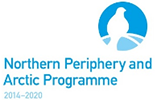Hankkeen tiedot |  |
| Nimi | Attract skills and talent through Regional Innovation Capacity insights |
| Aloituspäivä | 1.10.2024 |
| Lopetuspäivä | 31.3.2026 |
| www-sivut | - |
| Tila | Käynnissä |
| Yhteyshenkilö | Antti Kotimaa |
| Kuvaus | ASTRIC’s objective is to build institutional capacity for cooperation and territorial strategies to attract
needed skills and talent. Partners address the transformative processes of regions to achieve green and just transition by sharing good practices and jointly learning. These are concretized as joint action plans/strategies to uptake transferred and adapted evaluation solutions (i.e. METRIC), enabling the measurement of regional innovation ability and innovation capacity of ecosystems. |
| Kehittämistarve | The sparsely populated regions in this project share similar S3s industries as well as face common
territorial challenges in talent and skill attraction and retention. Shifting demographics of skilled people retiring and lack of attracting new skilled people to respond to market and innovation needs jeopardizes regional innovation ecosystems. EuroStat’s recent data show the pressing needs of regional SMEs, which are key economic actors, are obtaining skilled workforce and supportive regulations. Strong regional innovation capacity contributes to talent attraction for key stakeholders involved in achieving green and just transition in common S3 levels. Common challenges for public bodies are to build institutional capacity to understand regional innovation needs to support green and just transition, integrate evaluation processes, and create legislation to address market needs. ASTRIC provides opportunities to trans-nationally assess regional innovation capacity and develop solutions. |
| Toimenpiteet | Each region in ASTRIC is facing challenges to understand and navigate the innovation capacity of its
ecosystems and stakeholders. ASTRIC’s co-creative approach founded on the service design doublediamond model ensures common challenges are solved while simultaneously building institutional capacity for long-term impact. APPROACH: Impact analysis for stakeholders NOVELTY: Understanding the impact of public authority RDI initiatives (strategies, legislation, funding) APPROACH: Link the needed skills and talent to achieve regionally relevant green and just transition NOVELTY: Connect identified regional competence needs by reviewing the baseline and existing material APPROACH: Joint learning and capacity building in evaluation methods and tools NOVELTY: NUTS3 level evaluation of innovation capacity, regions monitoring themselves and other NUTS3 APPROACH: Measure innovation capacity NOVELTY: METRIC validated and upscaled APPROACH: Transferability and adaptability NOVELTY: Tailored method and tools; results used for policy suggestions |
| Tulokset | |
| Kumppanit | The partnership composition in this project is based on the rationale that the involved partners share
similarities in terms of their focus on innovation-driven economies, strong educational and research institutions, the urgent need of (more) talent, and thriving S3 sectors such as agrifood and technology. All partners share the commitment mindset to achieving green and just transition. Despite these similarities, the partners also complement each other through their specific strengths and expertise brought together on a transnational level, such as data and evaluation experience, innovation capacity building, and facilitating transferability. Each are committed to sharing and learning about systematic ways of monitoring the development of the innovations capacities and how it connects to talent attraction, ultimately enabling the public authorities to develop more impactful operations, strategies, and policies. Project Partner 1 (Lead Partner): Region Västerbotten (Sweden) Project Partner 2: Savonia (Finland) Project Partner 3: WDC (Ireland) Project Partner 4: AIM Center (Ireland) Associate Partners: Pohjois-Savon liitto, Umeå Kommun, Skellefteå Kommun |
| Rahoittaja | Interreg IVB Northern Periphery |
